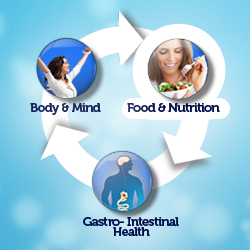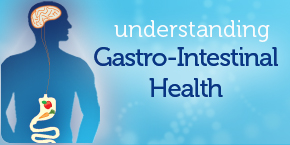Food & Nutrition
 The quality and quantity of food you consume is fundamental to your health and wellness. The nutrients in your food provide the building blocks for all your cells and organs of your body and so the expression “we are what we eat”.
The quality and quantity of food you consume is fundamental to your health and wellness. The nutrients in your food provide the building blocks for all your cells and organs of your body and so the expression “we are what we eat”.
Food contains a wide variety of nutrients and it is important that we have them in optimum amounts and in the right balance.
Nutrient excess or deficiency may affect cell, organ, body and mind function – and if prolonged lead to illness. Food also may contain harmful substances which can affect your cells, organ and so body and mind function.
All these factors highlight the importance of the food we eat.
We are all different, each person has a unique genetic makeup, constitution, lifestyle diet and environment, and so everyone has a unique health history. There is no one diet that fits all. In certain circumstances supplements may be necessary.
Nutrition is complex and can be difficult to understand.
The resources below are designed to provide knowledge, understanding, strategies and support through a holistic approach and assist you with treatment and prevention.
Food and Nutrition in more detail:
What is Nutrition?
Most people are confused about nutrition, and with good reason. We are continually bombarded with different and often conflicting messages about what we should and shouldn’t eat. Also, much of the information comes in snippets (eg the latest research findings) and so lacks the necessary depth and context to make it meaningful. Furthermore, it can sometimes be hard to differentiate between genuine evidence-based information and promotional material put out by food companies to sell products. The preponderance of fad diets can also cause confusion. Significantly too, much of the so-called ‘nutrition information’ fails to take into account the various obstacles which may be encountered on the road to improving dietary intake.
Essentially, health and wellbeing is dependent on organ function, which is dependant on cell function, which is in turn dependent on the nature and ratio of nutrients being taken up by the cells over time – along with their degree of exposure to toxins. Put another way, what you eat greatly affects our health and wellness.
It is important to be mindful also that the various buzzwords or expressions used to promote certain foods or food-types (eg ‘Low-fat’, ‘Lite’, ‘Low GI’) in many cases fail to give the complete picture. Although a given food or food-type may be low in fat, it may also be high in sugar or salt – a feature not generally advertised. In reality, many of the foods consumed today are highly processed – i.e. high in saturated fat, refined carbohydrate, sugar, or salt. They also tend to be low in protein, essential fatty acids (eg Omega 3s), fibre and many essential vitamins and minerals.
The genetic make-up of human beings is that of the Hunter-gatherer. We are built for famine rather than feast and are made to eat whole rather than processed foods. Generally speaking, whole foods are more likely to provide the appropriate amounts and ratios of nutrients being taken up by the cells
Our bodies aren’t adapted to deal with the excess fats, refined carbohydrate, sugar, and salt frequently found in processed foods. Furthermore, they require sufficient daily amounts of protein, Omega 3 and fibre for proper function.
You can learn more in the book:
Allergies & Intolerances
Adverse food reactions were historically considered to be primarily due to an allergic reaction to a protein component in the food.
Subsequently it has been found that there is another large group of adverse food reactions where there is no allergic reaction. These are known as food intolerances and due to chemical reactions to bioactive naturally occurring or added ingredients in food.
There is also a smaller group due to inherited inborn or acquired errors in body metabolism.
FOOD ALLERGIES
Food allergies are typically immediate reactions to foods and are potentially life-threatening. They are said to occur in approximately 1% of the population, but a recent survey at the Royal Children’s Hospital in Melbourne Australia reported an incidence in 1 year old babies of 10% and a 5 fold increase in severe reactions known as anaphylaxis The degree of reaction tends to be independent of the amount of the food consumed i.e. even tiny amounts may cause a severe reaction.
FOOD INTOLERANCES
Food intolerances in contrast to food allergies are generally not life-threatening. However they are more common. In many instances reactions to food intolerances are delayed (up to 48 to 72 hours).The severity of the reaction varies with the individual and the amount of food ingested. In many cases, the symptoms can be mild to severe, with durations that can be either short or long-term. Due to the delay between the intake of specific foods and the onset of symptoms, the connections between food intolerances and symptoms are not easily identified.
FOOD REACTIONS
Susceptibility to adverse food reactions will vary from person to person. This susceptibility is determined by a combination of genetic, medical, nutritional, environmental and stress factors.
Food allergies are more commonly experienced in infants and children whereas food intolerances are more common in older children and adults. Both allergies and intolerances may run in families and can also be triggered by sudden changes of diet, infections or severe and/or prolonged stress.
You can learn more in the book:
The role of Nutrition
From the moment we are conceived we are dependent upon optimum provision of good nutrition; Initially in the womb from the mother, from mother’s breast milk and then from the food we eat.
The amount, type and quality of the food we eat all play a major role in determining our health and well-being.
We all need daily optimum amounts of protein, fat and carbohydrate, together with vitamins and minerals, accessory nutrients and water to maintain health and wellbeing. Excesses or deficiencies of any of the nutrients can lead to nutrient imbalances, which can affect cell and organ function, and over time be detrimental to health thereby leading to poor mental and physical functioning and progressing eventually to disease.
Nutreint imbalances can be identified by keeping a food diary, testing for nutrient levels., and working with a healthcare professional.
You can learn more in the book:
Toxins & harmful substances in food
The body is subjected to toxins through the air we breathe, the food we eat, the water we drink. In addition we are subjected to exposure and absorption through the skin and through the production of toxins by infectious organisms anywhere in the body and by those produced as a result of the bodies metabolic processes. We are often exposed to multiple toxins over extended periods of time. The effects can be cumulative and overwhelming to our cells, organs, whole body and ultimately our health.
The body has a series of defence, detoxifying and eliminating systems to assist in the dealing with these harmful substances. The outcome depends on the one hand on the potency and dose of the toxin, and on the other hand, the strength of your defence, detoxifying and eliminating systems.
Examples of toxins are: air pollutants, chlorine, chemicals in food, pesticide residues, heavy metals etc
Examples of the body’s defence systems include:
The physical barrier of the skin, of the gastro intestinal lining, the lining of the respiratory, urinary and genital tracts
The secretions from these various linings may produce substances that can have a detoxifying effect. In the case of the digestive system there is the intestinal secretions including digestive enzymes.
The immune defence system composed of cells and antibodies which may inactivate many toxic substances.
The detoxifying substances produced by the liver that act on toxins that have entered the body
The actions of various cells dispersed through the various organs of the body
The excretion by the intestines, kidneys, skin and respiratory tracts.
Minimizing toxin exposure and maintaining a strong defence system is required for optimizing wellness and health and preventing disease.
If your symptoms or health concerns (e.g. past exposures to toxins, unexplained tiredness, cognitive dysfunction, rashes), indicate a need to properly assess your toxic load or weaknesses in your body’s defence systems you may be asked to do one or more of the following:
Blood tests, urine tests, faeces tests
For your toxic load identification a 7 day food Diary ( for chemicals in food) , enquiry about airborne pollutants ( home and external environment), blood and urine tests (for foreign chemicals in the body)
To assess your body’s various defence systems, we can arrange to test your gastrointestinal , liver and immune functions.
Treatment and management will be dependent on the clinical condition, your individual circumstances and their underlying causes.
In particular we recommend to minimize toxin exposure, optimize your natural defence system and if necessary detoxify which may require medical or alternative chelation therapy.
You can learn more in the book:
The Food Body Mind Connection
Body & Mind
Your body and mind are part of a holistic health picture. Symptoms such as chronic tiredness, energy depletion, depression, anxiety, hormonal, autism and child behaviour problems, high blood pressure, heart disease, diabetes and weight issues may be related to your nutrition and gastro-intestinal health.
>>Read More
Gastro-Intestinal
The Gastro-intestinal tract is the ‘gateway’ whereby food nourishes your body and mind while at the same time removing any harmful chemical substances. Symptoms an conditions include heart burn, reflux, irritable bowel syndrome, bloating, abdominal pain, constipation, diarrhoea and bleeding.
>>Read More
Food & Nutrition
The above infromation gives a good understanding of how gastro-intestinal health is part of the big picture.
The other parts of the Food Body Mind Connection are >>Food & Nutrition, and >> Body & Mind.





